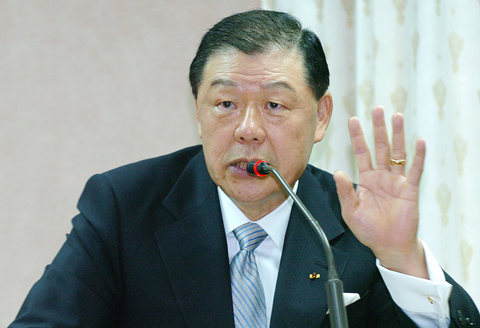American Institute in Taiwan (AIT) Chairman Raymond Burghardt yesterday denied a claim before a legislative committee by Jason Yuan (袁健生), Taiwan’s de facto ambassador in the US, that he had complained about being misquoted by the Taipei Times on more than one occasion.
On Wednesday, Yuan told the Foreign and National Defense Committee that Burghardt had “specifically mentioned the Taipei Times as misquoting him a few times and he felt he needed to clarify his stance.”
Speaking via BlackBerry message from Vietnam where he is traveling, Burghardt told the Taipei Times that he had “never mentioned the Taipei Times,” but that he had been critical of reports in Chinese-language newspapers, including “the relentless efforts of the Liberty Times [the Taipei Times’ sister paper] to ‘prove’ that the US is worried about [cross-strait] rapprochement.”

PHOTO: CHIEN JUNG-FONG, TAIPEI TIMES
Yuan’s claim before the committee followed a question by KMT Legislator and committee chair Justin Chou (周守訓) on why Burghardt had spoken on camera during his meeting with President Ma Ying-jeou (馬英九) last month, and whether Burghardt felt dissatisfaction with any particular media outlet.
In a separate message yesterday, Burghardt told the Taipei Times that “On speaking in front of the cameras when meeting Ma, there was nothing new. I did it more than once with [former president Chen Shui-bian, 陳水扁].”
It was not immediately clear if Yuan had confused the newspapers, but there was evidence that he did have the Taipei Times in mind. Yuan had told the committee that in response to “biased media reports,” his office was translating Taiwan-related news into English for daily distribution to US officials, and he argued that the government-funded Central News Agency (CNA) should cover all of Taiwan’s activities in the US to “balance out other reports.”
Wednesday was not a happy day for Yuan in the legislature. In addition to possibly misleading the committee over the “misquoting” of Burghardt, he contradicted himself on the number of US officials that had allegedly told him — off the record — that signing an economic cooperation framework agreement would facilitate a free trade agreement between the US and Taiwan.
When the discrepancy was raised by DPP Legislator William Lai (賴清德), Yuan denied that he had just claimed “more than one” US official had made the comments.
Lai then requested that a tape of Yuan’s speech from a few hours earlier be replayed, which established that Yuan had said this.
Yuan could not be reached for comment yesterday.

The High Prosecutors’ Office yesterday withdrew an appeal against the acquittal of a former bank manager 22 years after his death, marking Taiwan’s first instance of prosecutors rendering posthumous justice to a wrongfully convicted defendant. Chu Ching-en (諸慶恩) — formerly a manager at the Taipei branch of BNP Paribas — was in 1999 accused by Weng Mao-chung (翁茂鍾), then-president of Chia Her Industrial Co, of forging a request for a fixed deposit of US$10 million by I-Hwa Industrial Co, a subsidiary of Chia Her, which was used as collateral. Chu was ruled not guilty in the first trial, but was found guilty

DEADLOCK: As the commission is unable to forum a quorum to review license renewal applications, the channel operators are not at fault and can air past their license date The National Communications Commission (NCC) yesterday said that the Public Television Service (PTS) and 36 other television and radio broadcasters could continue airing, despite the commission’s inability to meet a quorum to review their license renewal applications. The licenses of PTS and the other channels are set to expire between this month and June. The National Communications Commission Organization Act (國家通訊傳播委員會組織法) stipulates that the commission must meet the mandated quorum of four to hold a valid meeting. The seven-member commission currently has only three commissioners. “We have informed the channel operators of the progress we have made in reviewing their license renewal applications, and

‘DENIAL DEFENSE’: The US would increase its military presence with uncrewed ships, and submarines, while boosting defense in the Indo-Pacific, a Pete Hegseth memo said The US is reorienting its military strategy to focus primarily on deterring a potential Chinese invasion of Taiwan, a memo signed by US Secretary of Defense Pete Hegseth showed. The memo also called on Taiwan to increase its defense spending. The document, known as the “Interim National Defense Strategic Guidance,” was distributed this month and detailed the national defense plans of US President Donald Trump’s administration, an article in the Washington Post said on Saturday. It outlines how the US can prepare for a potential war with China and defend itself from threats in the “near abroad,” including Greenland and the Panama

Taiwan People’s Party (TPP) Chairman Huang Kuo-chang (黃國昌) yesterday appealed to the authorities to release former Taipei mayor Ko Wen-je (柯文哲) from pretrial detention amid conflicting reports about his health. The TPP at a news conference on Thursday said that Ko should be released to a hospital for treatment, adding that he has blood in his urine and had spells of pain and nausea followed by vomiting over the past three months. Hsieh Yen-yau (謝炎堯), a retired professor of internal medicine and Ko’s former teacher, said that Ko’s symptoms aligned with gallstones, kidney inflammation and potentially dangerous heart conditions. Ko, charged with